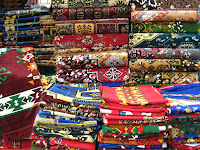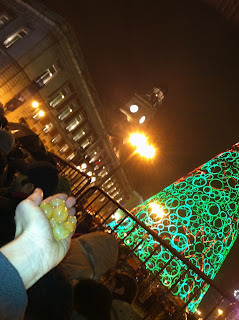December 2, 2007 - Riyadh, Saudi Arabia

A Toast: "Here's to this being as far as we can go."
~ Mike McCartt
Riyadh temperature high: 84 degrees F
Hood River temperature high: 50 degrees F
This adventure has slipped away too fast. Keeping up on my blog has been a challenge, due to the difficulty of wrapping my head around the experience. Although the Kingdom of Saudi Arabia has proven more amazing than ever imagined, much like any great venture, I have come away with more questions than answers.
On our last day in Saudi Arabia we visited the Shura Council and met Crown Prince Turki.
The Shura Council acts remotely like the U.S. Congress, with much less power. Council members are appointed by the king and are prominent, intelligent business and religious men from throughout the kingdom. The Shura Council advises the king on religion, education, and some social affairs (such as marriage). However, their collective power is very limited. All major decisions are made by the King and his cabinet members. Saudi Arabia has no constitution, instead most political and societal decisions reference the Qu’ran as the guiding written document.
Through my American eyes, which recognizes three branches of the government, in theory the King would be the executive, the Shura Council would be the legislative, and the Mutaween police would be the judicial. Historically the Mutaween, or the “religious police,” enforced Sharia (Islamic) Law based on beliefs from the Committee for the Propagation of Virtue and the Prevention of Vice.
The Mutaween and Committee for the Propagation of Virtue and the Prevention of Vice have the power to arrest unrelated males and females caught socializing, enforce Islamic dress-code, close stores for prayer time, mandate Muslim diets, prohibit eating pork, and have banned Valentines Day gifts. However, since 2002 when a Mutaween police officer prevented schoolgirls from escaping from a burning school in Mecca because they were not wearing their headscarves and abayas, causing 15 girls to burn to death, their influence has greatly deteriorated. Additional questions have rising around the requiring of convicts to memorize the Qu’ran in order to reduce jail sentences, appointing them “religious police”, and finally placing them on the streets to maintain order.
However, once again, the King (executive branch) makes all final decisions! Is this also becoming the case in the U.S.?
Upon departing the Kingdom of Saudi Arabia, two memories have risen to the surface as most memorable. While visiting a private museum collection in Dhahran, the collector displayed a beautiful 250 years old, handwritten, animal skin bound Qu’ran for our viewing. When I asked where she had obtained such a beautiful artifact, she responded, “It was recently obtained from Iraq”. Immediately after the U.S. invaded Iraq, the majority of museum artifacts methodically disappeared into private collections worldwide. Basically, a one 250 year old Qu’ran crossed over the border into Saudi Arabia and found its new non-temperature controlled home in Eastern Saudi Arabia.
My final memory is of a young Philippine man, living in Jeddah. Reeling from a lack-of-sleep, each morning was indicative of a stimulant. By the second morning in Jeddah, the young Philippine man would see me coming and say, “mocha-cappuccino for you today”. It is illegal for Saudi Arabian women to work. Leaving out 50% of the workforce, Saudi Arabia imports much of their labors from the Philippines, Korea, and other Asian and African countries. This influx of nationalities has created a much greater multicultural society than one would imagine. Knowing my espresso-bar man was not from Saudi Arabia, I began to ask him questions. He lives in Saudi Arabia for 11 months out of the year and travels home for 1 month. He works 7 days a week from 7:00am to 4:30pm with a 30 minute lunch break. I wish I would have asked him about sick-leave, how much he made an hour, and if the Kingdom of Saudi Arabia helps pay for his trip home each year. Basically, a young Philippines man migrated to Saudi Arabia to work 330 days straight in a temperature-controlled hotel in Western Saudi Arabia.

